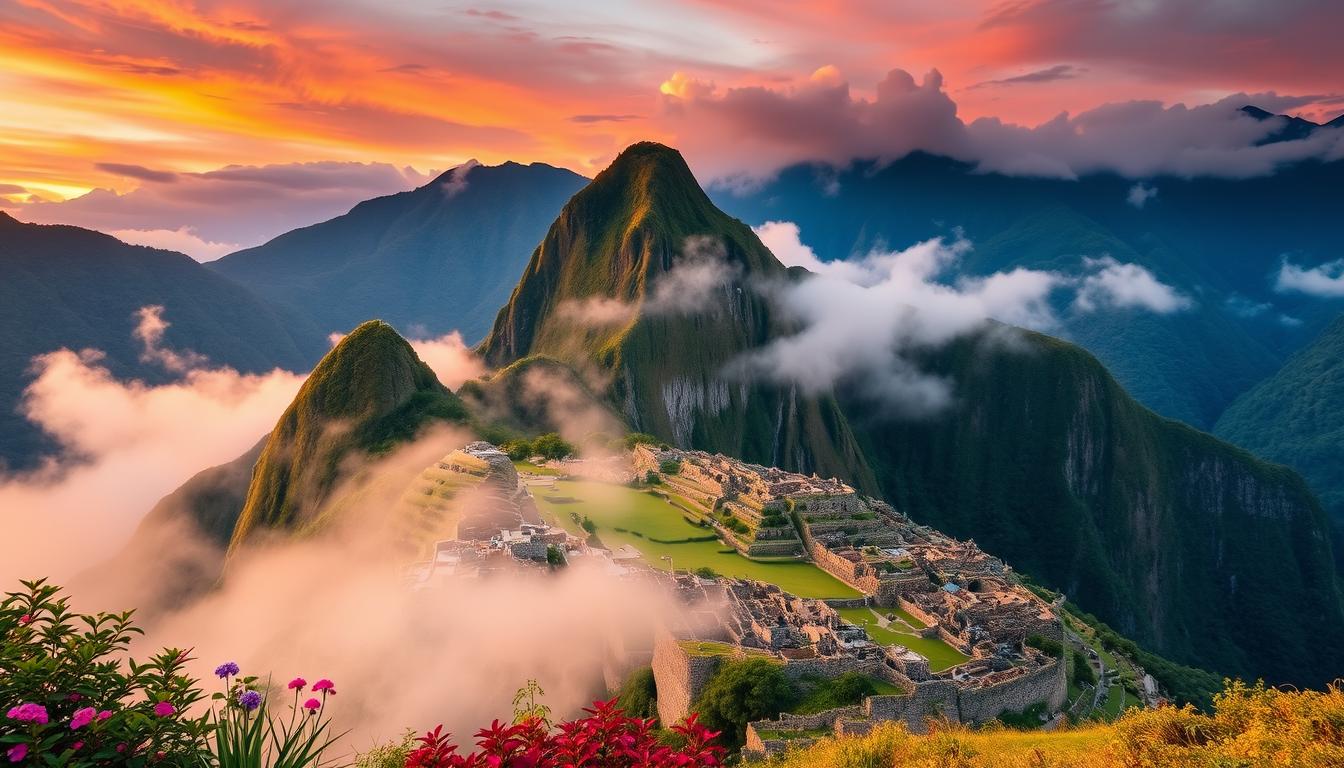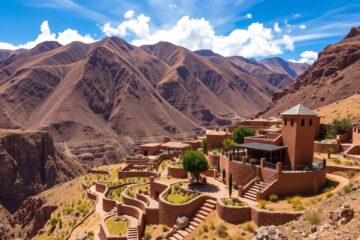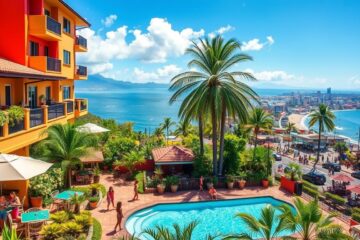Peru is home to diverse landscapes, from the Amazon rainforest to the Andean mountains and coastal areas. It offers many eco-friendly travel options. You can find luxury eco-lodges and community-based stays that aim to reduce environmental impact. These places provide unique, transformative experiences for travelers.
In Peru, eco-lodges and green hotels use new ways to be sustainable. They use solar power, collect rainwater, and build with traditional materials. These efforts help reduce carbon emissions and support local communities. They are perfect for tourists who want to see Peru’s natural beauty while being responsible.
Key Takeaways
- Peru offers a diverse range of eco-friendly accommodations, from luxury eco-lodges to community-based initiatives.
- Sustainable stays in Peru prioritize minimizing environmental impact through the use of renewable energy, water conservation, and traditional building materials.
- Many eco-lodges in Peru support local communities and conservation efforts, providing authentic cultural experiences for travelers.
- Peru’s eco-tourism sector is growing, offering a wide range of options for adventure-seeking and sustainability-minded travelers.
- Eco-lodges in Peru cater to different types of travelers, including families, couples, backpackers, and those seeking a weekend getaway.
Understanding Eco-Tourism in Peru’s Diverse Landscapes
Peru’s eco-tourism offers a wide range of experiences for those who love nature and want to travel sustainably. You can stay in Amazon eco-lodges, Andean sustainable hotels, or coastal green retreats. Each place offers a unique way to explore Peru’s beauty while being kind to the environment.
The Amazon Rainforest Experience
The Amazon Rainforest covers almost 60% of Peru. It’s a place full of life and greenery. Amazon eco-lodges let you get close to nature. You can see over 1,000 bird species, including those in Manu National Park, a UNESCO World Heritage Site.
Andean Mountain Retreats
The Andes mountains in Peru are peaceful and rich in culture. Andean sustainable hotels mix old and new, letting you learn about the area’s history while being green. The Inca Trail to Machu Picchu is a famous trek that shows Peru’s dedication to eco-tourism.
Coastal Eco-Retreats
Peru’s long coastline has many coastal green retreats. These places let you relax in eco-friendly spots with amazing sea views. They focus on reducing waste, using green energy, and working with local communities.
Eco-tourism in Peru aims to protect the environment, help local people, and give visitors unforgettable experiences. It’s all about exploring Peru’s natural and cultural wonders in a way that’s good for the planet.
Why Choose Sustainable Accommodations in Peru
Choosing sustainable accommodations in Peru is a smart move. It helps protect the environment and preserve local cultures. These eco-friendly lodges use green energy, reduce waste, and hire local staff. This way, they have less impact on nature and communities.
By staying in these lodges, you help keep Peru’s beauty and traditions alive. You get to experience the real Peruvian way of life. This creates a chance for deep cultural exchange.
- Peruvian Sunrise is certified by Travelife for its sustainability efforts and partners with hotels committed to reducing their environmental impact.
- Peruvian Sunrise follows a social responsibility program called “You Buy, We Plant,” donating one dollar for every traveler to plant a tree in Peru.
- Peruvian Sunrise supports entrepreneurship education programs in local communities to promote sustainable practices and drive sustainable economic development.
More people are choosing sustainable travel in Peru. They want to support the environment and local cultures. By staying in eco-friendly places, you help protect Peru’s nature, support local people, and keep the culture alive.
| Statistic | Value |
|---|---|
| Peru has 72 million hectares (178 million acres) of natural-growth forests, with 70% in the Amazon jungle region, comprising nearly 60% of the national territory. | 72 million hectares |
| Peru is losing nearly 300,000 hectares (741,000 acres) of forest annually due to deforestation caused by various factors. | 300,000 hectares |
| Deforestation has led to the reduction of territories belonging to indigenous peoples and the decline of the indigenous population in the Amazon basin from around 6 million to less than 2 million. | Decline from 6 million to less than 2 million |
Sustainable tourism in Peru is a powerful way to protect its beauty and culture. It also helps local communities economically. By choosing responsible travel, you can make a big difference in preserving Peru’s landscapes and traditions.
Luxury Eco-Lodges in the Amazon Basin
Luxury eco-lodges in the Amazon rainforest offer a unique experience. They combine luxury Amazon lodges with sustainable rainforest stays. These places blend comfort with conservation, giving guests a deep connection with nature.
Inkaterra Reserva Amazonica
Inkaterra Reserva Amazonica is a top choice for eco-friendly stays. It has 35 rooms and covers 24,700 hectares of rainforest. The lodge also has a natural apiary with over 540 butterfly species.
Guests can explore trails and learn about the area’s plants and animals.
Treehouse Lodge Experience
The Treehouse Lodge offers a special stay with 12 treehouses. They are 35-75 feet up, giving guests amazing views of the Amazon. The lodge uses solar panels and eco-friendly systems.
EcoAmazonia Lodge Features
EcoAmazonia Lodge covers 1,400 square miles. It has 50 bungalows that blend with nature. Guests can enjoy wildlife and help with the lodge’s green efforts, like rainwater harvesting.
Sacred Valley’s Sustainable Retreats
In the heart of Peru’s Andean eco-lodges, the Sacred Valley is a haven. It offers Sacred Valley accommodation that is both luxurious and eco-friendly. Willka T’ika, a wellness center since 1995, is a prime example. It respects the local community and nature deeply.
At Willka T’ika, guests enjoy a real Andean experience. They get to eat organic food, join healing ceremonies, and go on exciting adventures. Upcoming events include a Funky Door Yoga retreat in December 2025 and Essential Wellness Retreats in 2025. These events cater to travelers looking for meaningful, eco-friendly experiences.
“The staff at Willka T’ika are truly exceptional – their hospitality, responsiveness, and attentiveness to our needs made our stay truly magical,” raves one guest, highlighting the retreat’s ability to provide exceptional services in a serene, harmonious environment.
Las Qolqas Eco-Resort is another gem in the Sacred Valley. It offers luxury glamping with tents for 2, 4, or 8 guests. Located 42 miles from Cusco International Airport, it provides a sustainable adventure experience. Guests can hike and immerse themselves in local culture.
Looking for a yoga retreat or eco-friendly glamping? The Sacred Valley accommodation in Peru’s Andes offers unforgettable, sustainable journeys.
Lake Titicaca’s Eco-Friendly Options
Lake Titicaca sits high in the Andes, offering a unique eco-friendly travel experience. It’s at 4,000 meters above sea level. Here, you’ll find sustainable retreats that care for the environment and support local communities.
Titilaka Lodge Sustainability Practices
The Titilaka Lodge is a top choice for eco-friendly stays. It has rooms with stunning views of the lake. The lodge is committed to being green and is certified every year to ensure it meets high standards.
Community Integration Programs
The Titilaka Lodge also works closely with the local community. It involves villagers in tourism, helping to keep traditions alive and support the local economy. Guests can dive into the area’s rich culture, learning about and appreciating different ways of life.
| Sustainable Practices at Titilaka Lodge | Community Integration Initiatives |
|---|---|
|
|
Choosing to stay at Lake Titicaca eco-lodges and sustainable lake retreats lets you enjoy nature while helping protect it. You’ll support the area’s culture and environment.
Wildlife Conservation and Eco-Lodges
Peruvian eco-lodges are key in wildlife conservation. They offer nature experiences and help protect local ecosystems and biodiversity.
The Manu Wildlife Center is a great example. It offers tours and safaris in Peru’s wilderness. Guests can see animals like jaguars, giant otters, and macaws.
- Manu Wildlife Center’s tours help with research, habitat protection, and species preservation.
- Posada Amazonas, run by the Ese Eja community, offers wildlife experiences and supports local conservation.
Eco-lodges in Peru do more than just watch nature. They help protect it. Lodges like Inkaterra Reserva Amazonica have research stations to study and protect the rainforest.
| Eco-Lodge | Conservation Efforts |
|---|---|
| Inkaterra Reserva Amazonica | Harnesses solar energy and operates a biological research station for rainforest preservation. |
| Titilaka Lodge | Implements initiatives to reduce plastic waste and support sustainable agriculture in the Lake Titicaca region. |
| Colca Lodge Spa & Hot Springs | Actively engages with the local community to contribute to sustainable development in Colca Canyon. |
Staying at these eco-lodges lets travelers enjoy Peru’s beauty while helping protect wildlife and biodiversity. These places blend sustainable practices into the guest experience. It’s a meaningful way to see Peru’s natural wonders.
Traditional Architecture Meets Sustainability
Peruvian eco-lodges mix old architecture with new green practices. They use local materials, save energy, and respect nature. This makes for a unique stay.
Local Materials and Building Techniques
Eco-lodges in Peru use bamboo, timber, and adobe. For example, Rangra Wasi Eco Lodge has stone walls that match the Andean mountains. This way, they honor local traditions and cut down on waste.
Energy-Efficient Design Solutions
These lodges also use smart designs to save energy. They have special ventilation, windows for light, and solar panels. Plus, they collect rainwater and use green septic systems. This keeps them in tune with nature.
| Eco-Lodge Feature | Benefit |
|---|---|
| Use of local materials | Reduced carbon footprint, support for traditional craftsmanship |
| Natural ventilation | Decreased energy consumption, improved indoor air quality |
| Solar panels | Renewable energy generation, lower reliance on fossil fuels |
| Rainwater harvesting | Water conservation, reduced strain on local water resources |
| Eco-friendly septic systems | Proper waste management, protection of the natural environment |
Peruvian eco-lodges combine old and new to offer a special stay. They lessen their impact on the planet and celebrate local culture. Guests get a memorable and green experience.
Environmental Initiatives and Community Impact
Eco-lodges in Peru lead the way in environmental and community efforts. They offer more than just a place to stay. They work hard to protect nature and help local communities.
Amazon Planet is a great example. It focuses on saving the Amazon rainforest through conservation and wildlife rescue. Inkaterra Reserva Amazonica also protects a huge area of rainforest, keeping it safe for future generations.
- Many eco-lodges hire local people, giving them jobs and helping the economy.
- They also support education, health, and cultural exchange in local communities.
- The Potato Park project helps save landscapes, grow native crops, and support indigenous people.
Protecting the environment and helping communities is what eco-tourism in Peru is all about. By choosing community-based tourism, environmental programs, and social responsibility, travelers make a real difference. They get to experience a journey that changes them and helps others.
Conclusion
Peru has many eco-friendly places to stay, from luxury Amazon lodges to traditional Andean retreats. These spots offer unique experiences and help protect the environment and local communities.
Choosing sustainable travel in Peru helps reduce environmental harm. Using bikes, walking, or public transit cuts down on carbon emissions. Staying in small, locally-owned places also supports Peruvian families and businesses.
The study shows Peru’s hospitality industry is getting more into eco-friendly practices. This focus on the environment and community shows the potential for eco-friendly accommodation options to grow. It makes traveling in Peru even better.



